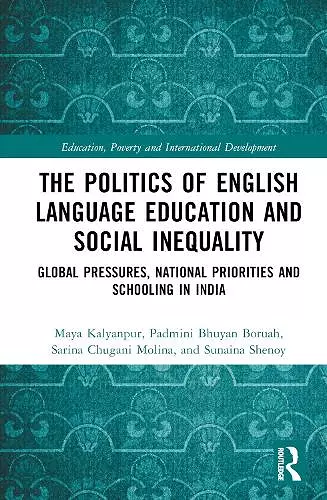The Politics of English Language Education and Social Inequality
Global Pressures, National Priorities and Schooling in India
Maya Kalyanpur author Padmini Bhuyan Boruah author Sarina Chugani Molina author Sunaina Shenoy author
Format:Hardback
Publisher:Taylor & Francis Ltd
Published:30th Dec '22
Currently unavailable, and unfortunately no date known when it will be back
This hardback is available in another edition too:
- Paperback£34.99(9780367646189)

Based on policy analysis and empirical data, this book examines the problematic consequences of colonial legacies of language policies and English language education in the multilingual contexts of the Global South.
Using a postcolonial lens, the volume explores the raciolinguistics of language hierarchies that results in students from low-income backgrounds losing their mother tongues without acquiring academic fluency in English. Using findings from five major research projects, the book analyzes the specific context of India, where ambiguous language policies have led to uneasy tensions between the colonial language of English, national and state languages, and students’ linguistic diversity is mistaken for cognitive deficits when English is the medium of instruction in schools. The authors situate their own professional and personal experiences in their efforts at dismantling postcolonial structures through reflective practice as teacher educators, and present solutions of decolonial resistance to linguistic hierarchies that include critical pedagogical alternatives to bilingual education and opportunities for increased teacher agency.
Ultimately, this timely volume will appeal to researchers, scholars, academics, and students in the fields of international and comparative education, English and literacy studies, and language arts more broadly. Those interested in English language learning in low-income countries specifically will also find this book to be of benefit to their research.
'This exquisitely complex book is invaluable for those of us seeking deeper understandings of the role played by English in magnifying economic inequalities globally. Building on wisdom drawn from their own life experiences with linguicide, transnationalism, and English-as-medium-of-education policies, these four authors render skilful analyses that shed light on the complicated dilemmas surrounding language-in-education policy. Offering insightful understandings widely applicable beyond the contemporary Indian context, the book provides supportive and constructive guidance for enacting critical resistance in the context of a range of often-neoliberal language policy reforms.'
Suhanthie Motha, Associate Professor of Applied Linguistics/TESOL, English Department, University of Washington, USA
'This book provides critical insights into processes of globalization and multilingual education from the perspective of the less privileged. Embodied by the personal experiences of four scholars from different regions and language groups, and richly situated in classrooms and communities in India, the book portrays dysfunctional outcomes. Educational policies motivated by the global pressures of economic progress and national goals of development hamper proficiencies in both heritage languages and English. We leave persuaded that a pedagogy that honestly addresses economic disparities, critiques ongoing colonial designs, and values heritage languages and epistemologies is more beneficial for the Global South.'
Professor Suresh Canagarajah, Pennsylvania State University, USA.
'This book makes a significant contribution to bringing together post-colonial scholarship on the politics and practices of language policies and language education. It draws on rich lived experiences of the diverse language identities of the authors. This richness is evident throughout the text as the authors engage in a nuanced manner with a complex intellectual terrain on language politics, whilst drawing on research evidence from the field. The arguments presented in the book also problematise the construction of disability and the labelling of learning disability especially in schooling contexts, such as those in India. The book raises important points in relation to how ‘disability’ labels are uncritically adopted in settings such as many English medium schools which provide access to first generation learners and largely non-English speakers from low-income background.'
Nidhi Singal, Professor of Disability and Inclusive Education, University of Cambridge, UK
'This provocative book will change how you think about language teaching and learning. In The Politics of English Language Education and Social Inequality, Kalyanpur, Boruah, Molina, and Shenoy offer an incisive analysis of how English language education operates as a colonizing presence. With a focus on a multilingual nation that has a complex relationship with English—India—the authors brilliantly weave personal experiences with research data and theory in order to illuminate reverberations of language policy, language teaching, and the language experiences of children across dimensions that range from identity to national policy to global domination.'
Christine Sleeter, Professor Emerita, School of Professional Studies, California State University-Monterey Bay, USA
'This book, authored by four Indian women, is unlike any other. It is written from the heart and from the women’s own life experiences and academic research. Theory about the role of English education in colonialism and globalization, as well as its relationship to poverty, flow here from the local Indian context, as the authors reflect jointly and foreground their own positionality. The book is an example of decolonial resistance not only to traditional English language education, but also to academic treatises that do not reveal the authors’ selves.'
Ofelia García, Professor Emerita, The Graduate Center, City University of New York, USA
ISBN: 9780367646165
Dimensions: unknown
Weight: 430g
200 pages